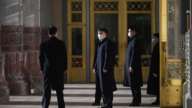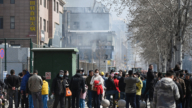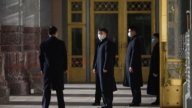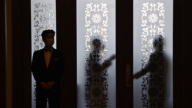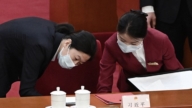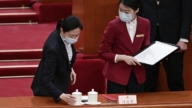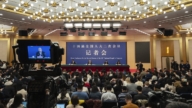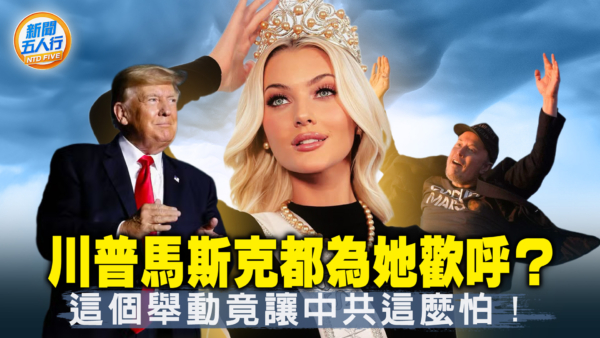【新唐人2012年3月14日讯】在中共人大会议重庆代表团9号记者会上,处于焦点的重庆市委书记薄熙来首次回应“王立军事件”,他说他对王立军的出走感到“很意外”,对任命王立军执行打黑,“用人失察”。但中国主要媒体对薄熙来的这一说法却一字不报。大陆学者分析,这说明中央对薄熙来的自我表白并不认可。但是为了十八大权力平稳过渡,一时还拿不定主意如何处置薄熙来和“王立军事件”。
薄熙来首次公开谈论“王立军事件”,国外媒体给予极大关注和解读。但是大陆中共媒体包括《人民日报》,《中央电视台》,甚至《重庆卫视》都不予报导。“浙江大学法与经济学研究所”创办人之一庄道鹤分析,这说明薄熙来虽然避重就轻撇清责任,但其实并没有“平安着陆”。
庄道鹤:“ 这个事情也是挺令人吃惊的。作为一个政治局委员,他讲的话和回答记者的提问,居然没有在主要的媒体上曝光,他的发言不被最高层认可,认为这是他单方面为自己表白。只能得出这个结论。”
香港英文媒体《南华早报》3月7号报导,一位接近中共高层的消息人士说,中共当局把王立军定性为“党和国家的叛徒”。在两会期间,胡锦涛告诉参加高层会议的政协委员,王立军是一个叛徒。重庆一定级别的官员也被告知,王立军背叛了国家。
《苹果日报》专栏评论文章指出,“王立军事件”的性质绝非薄熙来讲得那么轻描淡写,这是一位高干用双脚对中共的制度投以不信任票,对中共的国际声誉有直接冲击,而中共一向对“叛党叛国”等变节事件,深痛恶绝,这次王立军逃入美领馆,又岂会是一桩小事?薄熙来的责任,又岂止是用人不察那么简单?
原《百姓》杂志主编黄良天则分析说,中国的媒体是执政党和政府部门的延伸,是共产党和政府的一个宣传单位。“媒体的沉默”反映出当局对薄熙来的态度依然暧昧。外界很难预测中共“暗箱操作式”的政治斗争。黄良天认为,中共目前最大的考虑就是权力的平稳过渡,对于薄熙来的处理,要看中共内部利益集团的沟通和协商结果。
黄良天:“中央现在提出一个口号,就是稳定压倒一切,那什么是一切?包括宪法,也包括党纪。所以他们一切都是以非常平稳的过渡为最高原则。所以不要指望他们非常能够把中国建设成为一个法制祖国。所有的一切都为了十八大能够平稳的过渡。”
但海外《博讯》网站引述北京接近决策层的人士分析,有众多原因使中共中央决定要严肃处置薄熙来,薄不可能平安无事。原因包括:薄熙来的大量贪腐事实臭名远播,甚至传到美国政府耳朵里﹔搞“独立王国”,藐视中央权威﹔动用一切手段,有计划有步骤的争抢老大位置,私心与野心太大。擅自动用武装力量包围美领馆,有如变相兵变。
《苹果日报》的评论还认为,胡锦涛对薄熙来早已不满。“王立军事件”是胡锦涛用来对付薄熙来的一步棋。就像江泽民为对付北京市委书记陈希同,向陈的副手—-北京市副市长王宝森下手。王宝森之死,令江泽民对付陈希同出现一个缺口。因此如果胡锦涛要置薄于死地,王立军案正是调查薄熙来的巨大缺口。
采访编辑/秦雪 后制/萧宇
———————–
CCP Media Silent over Bo Xilai’s Replies to Reporters
Bo Xilai responded publicly to the Wang Lijun Incident for
the first time at a press conference on March 9.
Bo, the Chinese Communist Party (CCP) Secretary of
Chongqing, alleged that Wang ran-off “very unexpectedly”.
He said that he viewed his mistake as an oversight in
promoting Wang for the anti-vice campaign.
However, China’s major media remained silent,
making no comment on Bo’s explanation.
Analysts say that this shows denial on the part of
CCP central authorities’ in the face of Bo’s self-confession.
To secure the upcoming power transition,
the CCP leadership still hesitates in deciding
how to handle Bo and Wang’s incident,
according to a review of the situation by observers.
Bo Xilai’s first time talk about the Wang Lijun Incident has
attracted a great deal of attention and
attempts at interpretation from media in China and abroad.
In contrast, the CCP official media did not report on the news.
Zhuang Daohe, one of the founders of the Law and Economics
Institute at Zhejiang University analyzes the issue.
“This indicates that Bo has not yet made a “safe landing"
even though he has beat around the bush to steer clear of fully explaining the incident, says Zhuang.
Zhuang Daohe says: “This is really surprising.
He is a Politburo member.
It’s incredible that the major media hasn’t reported
his actual words and replies to reporters.
The (CCP) top leadership might not agree with his remarks,
or perhaps they wanted to view it as his unilateral expression, I think."
Hong Kong’s South China Morning Post reported on March 7,
that a source close to the CCP leadership has said that Wang
had been labeled a “traitor to the Party and the country".
Hu Jintao told the senior Political Consultative members that
Wang was a traitor, during the period of the two sessions.
Meanwhile, Chongqing officials at certain levels were informed
that Wang had betrayed the country.
The Apple Daily’s review pointed out that the nature of
the Wang incident is not as insignificant as the impression given by Bo in his answers to reporters.
This was a senior CCP official casting a vote of no confidence
in the regime, and a direct shadow over the CCP’s international image.
The review doubted very much that Wang’s fleeing to
the US consulate is really trivial to the CCP.
The regime has always deeply hated occurrences of
defection to a foreign power.
And will Bo Xilai’s liability be limited to his mistake in
Wang’s promotion? Is the article’s question.
Former chief editor of Baixing magazine, Huang Liangtian,
views China’s media as a propaganda unit of the CCP.
“Media silence" reflects the CCP’s ambiguous attitude
towards Bo Xilai.
Outside among the public it is hard to predict the likely
outcome of the CCP’s black-box political infighting, says Huang.
Currently, the biggest concern for the CCP is to
secure a smooth power transition.
Huang analyzes that how Bo’s case is handled will
depend on developments within the CCP’s own internal communications and negotiations.
Huang Liangtian: “The (CCP) Central Committee now touts
the importance of stability as overriding every other consideration.
What does ‘every other consideration’ refer to?
It covers the Constitution and Party discipline.
So all they’ve done is to assure and secure a very smooth power transition.
Don’t expect them to turn China into a country under the rule of law."
Boxun.com has quoted an analysis from a source close to
the CCP’s top leaders.
Many reasons have influenced the CCP in deciding on a
serious and careful way to handle the Bo Xilai crisis.
Bo’s case won’t be uneventful, the source has promised.
The reasons for this prediction include:
Bo’s vast and notorious corruption, the facts of which are
known even to the U.S. government;
Bo’s set-up of an “independent kingdom" in Chongqing,
which was clearly a show of open contempt towards the CCP’s central authorities;
Bo’s ambitious ploy to grab the CCP’s top leader position;
and Bo’s unauthorized use of armed force to besiege
the US consulate, amounting to a military coup.
According to the Apple Daily’s review, Hu Jintao has long
been discontent over Bo Xilai.
The Wang Lijun incident allows Hu to move against Bo.
A similar move was used by Jiang Zemin when he toppled
Chen Xitong, then the CCP Secretary of Beijing.
Jiang caused the suicide of Chen’s assistant, Wang Baosen,
who was at the time Vice Mayor of Beijing.
The death of Wang Baosen left an excuse that allowed
Jiang Zemin to move against Chen Xitong.
Thus, if Hu Jintao wants Bo removed, the Wang Lijun incident
would be an good excuse for an investigation into Bo Xilai.



